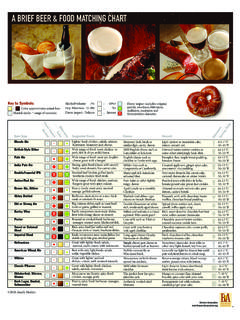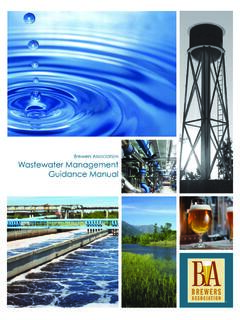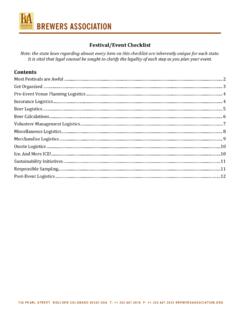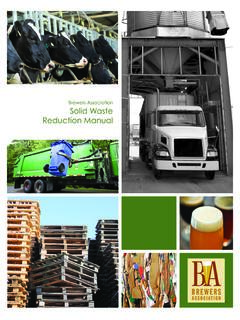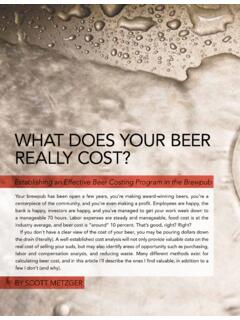Transcription of Beer Franchise Law Summary - Brewers Association
1 Beer Franchise Law Summary by Marc E. Sorini,* McDermott Will & Emery LLP Counsel for the Brewers Association Before entering a relationship with a beer wholesaler, a brewery should become familiar with the state laws that regulate brewer-wholesaler relationships. Such beer Franchise laws frequently dictate many terms of a brewer-wholesaler agreement, trumping contrary terms in any contract. What follows is a brief discussion of the typical beer Franchise law, followed by a survey of beer Franchise law in each of the fifty states, plus the District of Columbia.
2 This Summary necessarily omits or generalizes many aspects of the states regulation of brewer-wholesaler relations. Moreover, laws may be amended and are invariably the subject of court cases, regulations, and informal interpretations by alcohol control authorities that can substantially change a law s actual effect. Always seek the professional advice of a competent lawyer before drafting a contract, terminating a wholesaler, or initiating other legal action. For simplicity and readability, the Summary uses plain English terms wherever possible.
3 This may mask subtle complexities and distinctions. Thus, although the Summary discusses a brewery s ability to terminate a wholesaler, legal restrictions applied in termination situations may also restrict cancellations, failures to renew, and/or attempts to modify a distribution agreement. Another example is the term insolvent, which is used below to encompass an assignment for the benefit of creditors and voluntary or involuntary bankruptcy. Finally, this Summary is written with domestic small Brewers in mind, and discusses a brewer s rights and obligations.
4 In reality, beer Franchise laws generally apply to any beer supplier, including importers acting as a wholesaler s supplier. The state-by-state Summary focuses on the provisions that are likely to be of paramount importance to a small brewer entering into a new Franchise relationship: (1) written agreement obligations; (2) exclusivity requirements or prohibitions; and (3) termination provisions. I have therefore passed over a great many beer Franchise law provisions, both common and uncommon. To give a sense of the provisions that are often encountered, I begin with an overview of a typical beer Franchise law.
5 The Typical Beer Franchise Law A majority of the states have enacted full-fledged beer Franchise laws. Although it is not hard to detect a whiff of protectionism in these enactments, their stated purpose is to correct the perceived imbalance in bargaining power between Brewers (who are presumed to be big and rich) and wholesalers (who are presumed to be small and local). Temperance concerns are also cited. A full-fledged beer Franchise law will usually: 1. Define Franchise agreements to include informal, oral arrangements, making any shipment to a wholesaler the start of a Franchise relationship.
6 2. Prohibit coercive brewer practices, most often including actions in which a brewer (a) requires the wholesaler to engage in illegal acts, (b) forces acceptance of unordered beer, or (c) withholds shipments in order to impose terms on the wholesaler. 3. Require good cause or just cause before a brewer can terminate a wholesaler. The burden is generally on the brewer to demonstrate cause for termination. Good cause is usually defined to include a significant breach of a reasonable and material term in the parties agreement.
7 4. Dictate that a brewer give prior written notice (60 or 90 days is common) to a wholesaler before termination is effective, with the notice detailing the alleged deficiencies that justify termination. 5. Grant wholesalers an opportunity to cure the deficiencies alleged in a termination notice, with termination ineffective if a wholesaler cures the defect(s) or presents a plan to cure the defect(s). Notice-and-cure requirements usually are waived under certain circumstances. These most often include a wholesaler s (a) insolvency, (b) conviction or guilty plea to a serious crime, or (c) loss of a license to do business.
8 Many Franchise laws also permit expedited termination where a wholesaler (d) has acted fraudulently or (e) has defaulted on a payment under the agreement despite a written demand for payment. 6. Require wholesalers to provide Brewers with notice of any proposed change in ownership of the wholesaler, giving the brewer an opportunity to object. The brewer s approval of an ownership change cannot be unreasonably withheld. Brewers usually have little or no right to block a transfer to a previously designated family successor.
9 7. Create remedies for unfair termination, generally granting wholesalers the right to receive reasonable compensation following termination. Most beer Franchise laws grant wholesalers the right to seek an injunction that, if granted, would quickly halt termination proceedings pending the resolution of wrongful termination claims. The forum for such relief can be either a state court or the state s alcohol control authorities. Although arbitration of the entire dispute is not required, and sometimes prohibited, disputes over what constitutes reasonable compensation often must be arbitrated at the request of a party.
10 Even if the Franchise law prohibits arbitration, an arbitration clause in the parties written agreement is likely enforceable under the Federal Arbitration Act if the parties reside in different jurisdictions. 8. Declare any waiver of Franchise law protections void and unenforceable. 9. Set a date that the law becomes effective. Some Franchise agreements may predate Franchise acts effective dates, likely making the Franchise law inapplicable to that agreement. In addition to the extremely common provisions described above, other terms may: 10.

